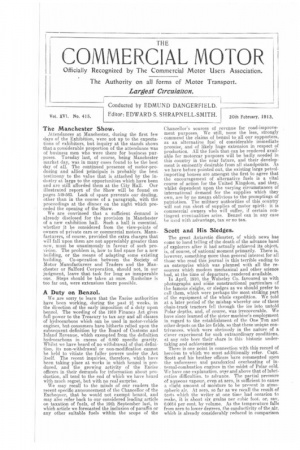A Duty on Benzol.
Page 1

If you've noticed an error in this article please click here to report it so we can fix it.
We are sorry to learn that the Excise authorities have been working, during the past 21 weeks, in the direction of the early imposition of a duty upon benzol. The wording of the 1910 Finance Act gives full power to the Treasury to tax any and all classes of hydrocarbons which can be used in motor-vehicle engines, but consumers have hitherto relied upon the subsequent definition by the Board of Customs and Inland Revenue, which exempted from the definition hydrocarbons in excess of 0.800 specific, gravity. Whilst we have heard of no withdrawal of that definition, its non-withdrawal or non-modification cannot be held to vitiate the fuller powers under the Act itself. The recent inquiries, therefore, which have been taking place at works in which benzol is produced. and the growing activity of the Excise officers in their demands for information about production, all tend to the end of which we have heard with much regret, but with no real surprise. We may recall to the minds of our readers the recent specific announcement of the Chancellor of the Exchequer, that he would not exempt benzol, and may also refer back to our considered leading article on taxation of fuels, of the 19th September last, in which article we forecasted the inclusion of paraffin or any other suitable fuels within the scope of the
Chancellor's sources of revenue for road-improvement purposes. We still, none the less, strongly commend the claims of benzol to all our supporters, as an alternative fuel of considerable immediate promise, and of likely huge extension in respect of production. All the fuels that can be rendered available for motorcar purposes will be badly needed in this country in the near future, and their development is eminently desirable from all standpoints. As we have before pointed out., the existing large petrolimporting houses are amongst the first to agree that the encouragement of alternative fuels is a vital course of action for the United Kingdom, and they, whilst dependent upon the varying circumstances of international demand for the supplies which they own, are by no means oblivious to the promptings of patriotism. The military authorities of this country will not run short of supplies of motor spirit: it is commercial owners who will suffer, if certain contingent eventualities arise. Benzol can in any case be used with advantage, tax or no tax.
































